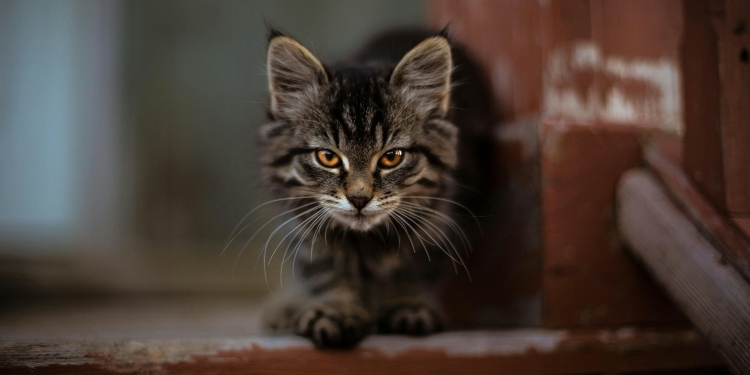Looking after a cat is a big responsibility, so naturally, you’ll want to ensure they live their best life and remain happy and healthy. Unfortunately, there are some nasty bugs and diseases that can affect your feline even when you’ve done everything you can to protect them, with Feline Infectious Peritonitis (FIP) one of the most intrusive – but what is it exactly and is there any way you can help your cat avoid it?
What is Feline Infectious Peritonitis (FIP)?
Very contagious and potentially fatal, Feline Infectious Peritonitis (FIV) is a serious viral disease in cats that is caused by an infection with FCoV, the feline coronavirus. As per the Blue Cross, this isn’t the same virus as COVID-19 and it does not affect humans, but it is common in large groups of cats along with young cats under two years old and some older felines. There are two types of FIP a cat can have:
Effusive FIP (Wet) – This is characterised by the build-up of fluid in the abdominal cavity, chest, or both, leading to symptoms such as difficulty breathing, lack of appetite, swollen abdomen, and lethargy.
Non-effusive FIP (Dry) – The non-effusive form has fewer specific symptoms, but can be equally serious. Weight loss, fever, jaundice, and neurological disorders can all be signs of this as it progresses.
If they have it, many cats will have a mixture of both types of FIP at different stages rather than one or the other. As with any type of symptoms, it’s best to speak to your vet if your cat begins to show signs of anything unusual.
What Causes FIP and How is it Transmitted?
Whilst it is uncommon and many cats who do have feline coronavirus will generally be healthy, sometimes this can develop into FIP. This mutation makes it a much more serious disease and it can be difficult to diagnose as the symptoms are similar to other conditions your cat may have.
A cat can become exposed to feline coronavirus from being around other cats, which is why multi-cat households or being in a shelter can make this more common. As it is very contagious, common ways that a cat can become infected include from being in contact with faeces and urine in litter boxes, saliva from grooming and sharing water bowls, and also the blood of an infected cat.
As mentioned, not all cats who catch FCoV will develop FIP, but there are some breeds that are more susceptible than others such as Ragdoll, Bengal or British Short Hair. A cat can also be at higher risk if they are under 2 years old, have experienced stress such as from changes to living environment, or have a weak immune system.
Can FIP Be Prevented?
As FIP develops from FCoV, this means stopping your cat from catching feline coronavirus is the only preventative measure. As it is transmitted from other cats who have this, you’ll need to reduce contact with other cats as much as possible, which can be difficult depending on their lifestyle and living arrangements. For example, if you have an indoor cat and it is not a multi-cat household, there is less chance of catching FCoV. However, if you got your cat from a shelter or it was previously around other cats, they may have come into contact with this. Similarly, if you have a cat that roams outdoors, this increases the chances of meeting other cats who may have FCoV.
There are some preventative measures to try that will help reduce the chances of your cat from catching FCoV and developing FIP:
- Regularly clean – Regularly cleaning litter boxes and feeding areas is the best way to reduce any spread of feline coronavirus, especially if you have a multi-cat household.
- Placement of food and water bowls – keep these away from litter trays to avoid contamination.
- Have enough space – In a multi-cat household, it’s best to ensure there is plenty of space and that it doesn’t become overcrowded e.g. too many cats in the home.
- Be mindful of stress – a stressful environment or situations like moving, breeding or putting your cat into a cattery when away can impact their immune system.
- Going to the vet – As with many situations, going to your vet regularly can ensure your cat is in good health and can be checked for any symptoms. They will also be able to provide further advice.
The Importance of Visiting the Vet
Your vet is best equipped to help in any situation where your cat isn’t acting normally or when you are worried about any potential symptoms. They will also be able to ensure any vaccinations are maintained to help in general, however, FIP itself doesn’t currently have a vaccine in the UK.
As it can be hard to diagnose, your vet may have to run a few different tests if FIP is a concern such as a blood test, scans or a fluid sample. They will be able to advise the best course of treatment if FIP is diagnosed. As with any trip to the vet, whether it’s a routine check-up or for any particular treatment, this can be expensive without insurance to cover the costs. With a good pet insurance policy that covers your pet’s needs, you won’t be left out-of-pocket when paying for any treatment if your cat does become sick. This way, you won’t have to choose between your finances and their wellbeing.
When it comes to treatment for FIP, your vet may prescribe antibiotics to help treat the infection, as well as pain relief. The length of time they will need treatment will vary between cats, with some needing this for several days but others may need this for many months. Again, your vet will be able to advise the appropriate treatment and length if diagnosed.
- They may need antiviral drip treatment to help stabilise them. This may mean your cat being kept at the vet overnight for a few days so they can monitor them.
- There are two drugs used in the UK for treatment which can take at least 12 weeks, including injections and an oral antiviral.
Depending on the severity of the disease and how your cat responds to treatment, your vet may recommend continued treatment at home. They will generally advise to keep them indoors and away from other cats in the household.
Keeping Your Cat Healthy and Happy
Whilst FIP is very serious and can lead to severe consequences if untreated, fortunately, it is still rare and thanks to advancements in treatment, there is a better chance of recovery. However, taking preventative measures is important and if you suspect your feline does have any symptoms or isn’t acting like their usual self, seek advice from your vet as soon as possible.
Being cautious and helping your cat avoid coming into contact with FCoV is the best method of prevention. If you are unsure of how best to do this at home, speak to your vet for more advice. Hopefully, your cat will never develop FIP and live a long, enjoyable life where they can concentrate on being relaxed, a little mischievous, but still adorable.
David Prior
David Prior is the editor of Today News, responsible for the overall editorial strategy. He is an NCTJ-qualified journalist with over 20 years’ experience, and is also editor of the award-winning hyperlocal news title Altrincham Today. His LinkedIn profile is here.




![7 Best POS Software in the UK [2026 Edition]](https://todaynews.co.uk/wp-content/uploads/2026/02/7-Best-POS-Software-in-the-UK-2026-Edition-360x180.png)








































































